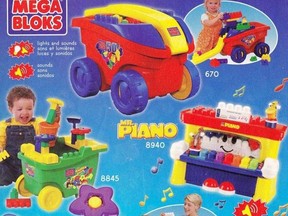Business
Small Canadian Firm Transforms Toy Industry with Mega Bloks

In a remarkable journey that began in 1967, the small Montreal-based company, Ritvik Holdings, has grown into a major player in the global toy industry with its flagship product, Mega Bloks. Initially established to distribute toys manufactured outside Canada, the company transitioned into toy design and manufacturing, ultimately capturing the hearts of children and securing a significant market share.
Victor Bertrand, the founder of Ritvik Holdings, was just 17 when he entered the toy industry. By the time he launched his own company at the age of 20, he had amassed considerable knowledge about the business. Ritvik Holdings quickly expanded its operations, leveraging its expertise in plastic injection molding and design to carve out a niche in the Canadian toy market.
The breakthrough came in the early 1980s when Ritvik developed a new building block toy, Mega Bloks. This innovative product was displayed at trade shows in 1984 and rapidly gained popularity among retailers and young children alike. The interlocking bricks offered a safer alternative to traditional small building blocks, significantly appealing to parents concerned about choking hazards.
Bertrand’s design was inspired by the international success of Lego, a brand that had been dominating the toy market since its inception by Ole Kirk Christiansen in 1932. Recognizing a gap in the market for larger, toddler-friendly blocks, Bertrand created Mega Bloks with jumbo interlocking nubbins, allowing for creative play without the risks associated with smaller pieces.
Despite initial resistance from advisers, the product launched successfully, leading to a monumental order of $1 million from Charles Lazarus, founder of Toys R Us, just two years after its debut. This marked Ritvik’s entry into the international market, and the company began selling Mega Bloks in over 30 countries, including the United States and Europe.
As Mega Bloks grew in popularity, Ritvik Holdings faced competition from Lego and its own line of larger blocks, Duplo. The company diversified its product line, introducing themed play sets and preschool toys that integrated with Mega Bloks. In the late 1990s, Ritvik began developing smaller block sets, known as Micro Mega Bloks, which were designed to be compatible with Lego bricks. This strategic move, however, led to legal challenges from Lego, culminating in a lawsuit in 1996 alleging unfair competition.
The case lingered in the courts for years, but in 2005, Canadian courts ruled in favor of Ritvik, stating that the company had successfully differentiated its products from Lego. Similar rulings followed in the U.S. and European courts, allowing Mega Bloks to continue its growth trajectory.
Under the leadership of Bertrand’s sons, Marc and Victor Jr., Ritvik Holdings transitioned to Mega Bloks, Inc. in 2002, going public on the Toronto Stock Exchange. The company continued to innovate, expanding its market presence and licensing popular characters from franchises like Sesame Street and Harry Potter.
In 2014, toy giant Mattel Inc. acquired Mega Brands, which included Mega Bloks, for $460 million. Despite the acquisition, the company’s headquarters remained in Montreal, ensuring its roots in Canada. Mega Bloks became the largest toy manufacturing facility in North America, although production eventually moved overseas, resulting in job losses but preserving some positions in administration and design.
The legacy of the Bertrand family extends beyond business. The Rita & Victor Bertrand Foundation established a bursary at Montreal’s West Island College, supporting students in their educational journeys. This initiative highlights the family’s commitment to education and empowerment.
Today, Mega Bloks continues to be a beloved construction toy brand, fostering creativity in children and their families. As it stands as a testament to innovation and resilience, the story of Ritvik Holdings and its transformation into a global toy industry leader remains an inspiring chapter in Canadian business history.
-

 Science4 months ago
Science4 months agoToyoake City Proposes Daily Two-Hour Smartphone Use Limit
-

 Top Stories4 months ago
Top Stories4 months agoPedestrian Fatally Injured in Esquimalt Collision on August 14
-

 Health4 months ago
Health4 months agoB.C. Review Reveals Urgent Need for Rare-Disease Drug Reforms
-

 Technology4 months ago
Technology4 months agoDark Adventure Game “Bye Sweet Carole” Set for October Release
-

 World4 months ago
World4 months agoJimmy Lai’s Defense Challenges Charges Under National Security Law
-

 Lifestyle4 months ago
Lifestyle4 months agoVictoria’s Pop-Up Shop Shines Light on B.C.’s Wolf Cull
-

 Technology4 months ago
Technology4 months agoKonami Revives Iconic Metal Gear Solid Delta Ahead of Release
-

 Technology4 months ago
Technology4 months agoApple Expands Self-Service Repair Program to Canada
-

 Technology4 months ago
Technology4 months agoSnapmaker U1 Color 3D Printer Redefines Speed and Sustainability
-

 Technology4 months ago
Technology4 months agoAION Folding Knife: Redefining EDC Design with Premium Materials
-

 Technology4 months ago
Technology4 months agoSolve Today’s Wordle Challenge: Hints and Answer for August 19
-

 Business4 months ago
Business4 months agoGordon Murray Automotive Unveils S1 LM and Le Mans GTR at Monterey









